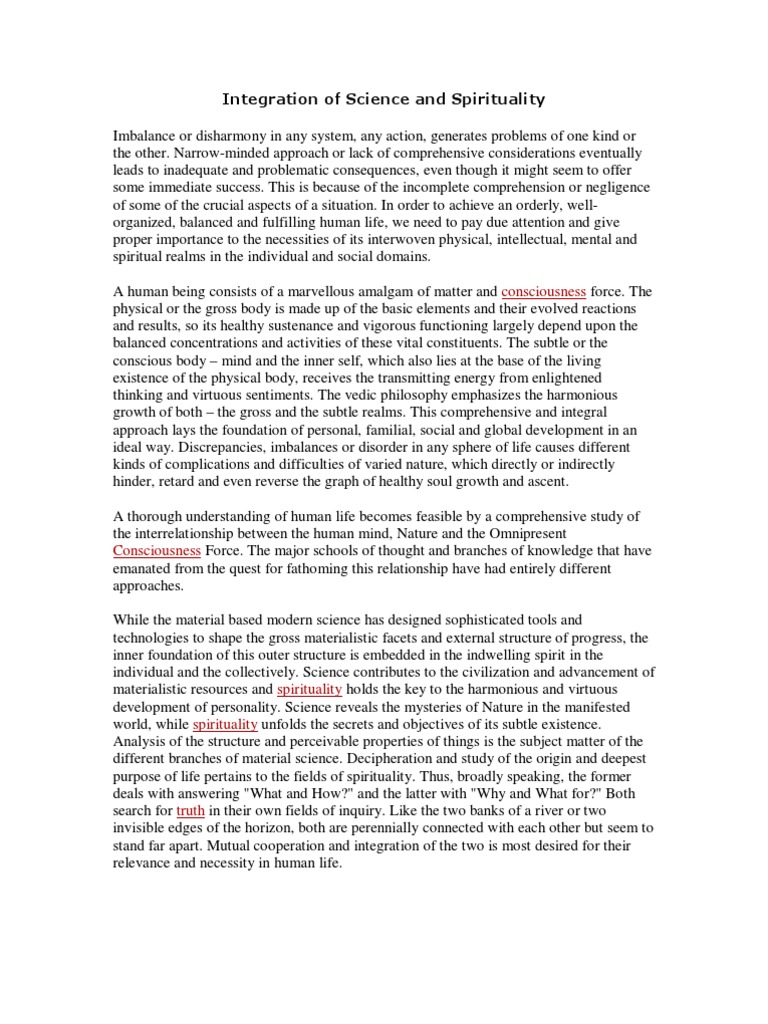The intertwined relationship between science and spirituality forms a cornerstone of Bahá’í teachings, advocating for the harmonization of empirical knowledge and spiritual truths. In this landscape, the essence of truth is dual-faceted: while science explores the material world through systematic inquiry, spirituality unveils the metaphysical dimensions of existence. Understanding why these two domains must advance together is essential for fostering a holistic comprehension of humanity’s purpose and destiny.
At the outset, it is crucial to understand the Bahá’í perspective on the nature of science. Science, as envisaged by Bahá’í teachings, is not merely a collection of facts and figures; it is a dynamic process of discovery that propels human advancement. The Bahá’í writings suggest that the natural world operates under immutable laws, which, when understood, can lead to profound benefits for society. Thus, the pursuit of scientific knowledge becomes a sacred duty, illuminating the path toward human development and well-being.
Conversely, spirituality embodies the inner dimensions of existence, encompassing moral values, ethical frameworks, and the intrinsic purpose of life. Bahá’í teachings postulate that spirituality should inform the ethical application of scientific advancements. For instance, while technology has the potential to enhance quality of life, it may also lead to moral quandaries regarding privacy, equity, and the environment. Herein lies the importance of integrating spiritual insights to ensure that scientific progress operates within the realm of compassion and justice.
One of the notable contributions of the Bahá’í Faith to this discourse is the principle of unity. The call for the unity of science and spirituality stems from the understanding that both realms originate from the same divine source. Bahá’u’lláh, the founder of the Bahá’í Faith, articulated that true science and true religion should be in harmony—each substantiating the other. This intertwining underscores that scientific discoveries must be embraced not only for their material implications but also for their potential to enhance spiritual understanding and moral responsibility.
To delve deeper into why these domains must coalesce, consider the disparity that arises when one is favored at the expense of the other. Historically, periods of scientific dominance led to a disenchantment with spirituality, breeding a mechanistic view of human existence. Individuals may find themselves ensnared in existential crises, devoid of purpose beyond material acquisition. Alternatively, an exclusive focus on spirituality can render societies stagnant, neglecting the innovations that science can offer for improving living conditions. The solution lies in fostering an environment where scientific inquiry is guided by ethical imperatives drawn from spiritual principles.
Moreover, the symbiosis between science and spirituality can be clearly illustrated through contemporary global challenges, such as climate change, public health crises, and social inequities. Scientific research has unveiled the causes and potential solutions to these pressing issues, yet without a spiritual context, the urgency of collective action may be diluted. The Bahá’í teachings encourage individuals to cultivate virtues such as stewardship and altruism, which are essential for nurturing a spirit of cooperation in tackling societal challenges. This principle embodies the belief that the spiritual development of individuals leads naturally to social progress.
Furthermore, engaging in dialogues that bridge both science and spirituality can inspire new avenues for understanding. For instance, the exploration of consciousness—a quintessentially spiritual interest—is increasingly intersecting with neurological studies. Research into the brain’s functioning offers valuable insights that resonate with spiritual concepts of awareness and interconnectedness. This cross-pollination of ideas not only enriches both fields but also deepens the appreciation for human experience as a multifaceted phenomenon.
In addition, the Bahá’í teachings advocate for the necessity of education as a unifying force. Education in a holistic sense should encompass science and spirituality, creating individuals who are not only knowledgeable but also ethically conscious. The integration of moral education into the curriculum is essential in nurturing future leaders who can approach issues with a balanced mind—grounded in scientific reasoning yet guided by profound spiritual values. In this light, educational institutions are called to foster environments where inquiry is encouraged and intellectual growth is aligned with moral development.
Lastly, the call for unity advocates for a global vision of collaboration. The challenges facing humanity today are inherently interconnected, transcending geographical boundaries and cultural differences. Consequently, an integrated approach that leverages both scientific and spiritual insights can serve as a beacon of hope. A united effort can create modalities of action that resonate on a planetary scale, ultimately leading to the establishment of a just and prosperous global community.
In conclusion, the essential alignment of science and spirituality is not only desirable but imperative for the advancement of human civilization. As the Bahá’í teachings articulate, this integration is a pathway toward holistic development, where scientific prowess is coupled with spiritual wisdom. The mutual enrichment of these domains can illuminate the complexities of existence, enabling humanity to navigate challenges thoughtfully and compassionately. By embracing this dual approach, individuals can aspire to foster a world where knowledge and virtue coalesce, engendering progress that is not only material but profoundly transformative on a spiritual level.
